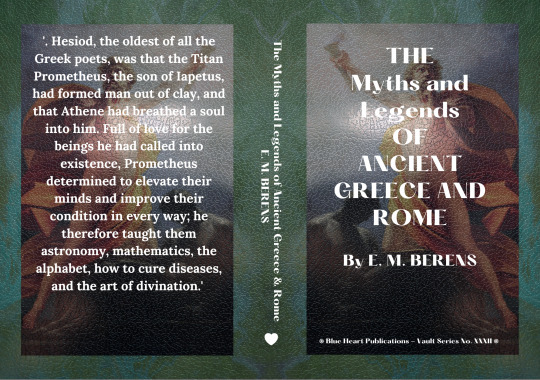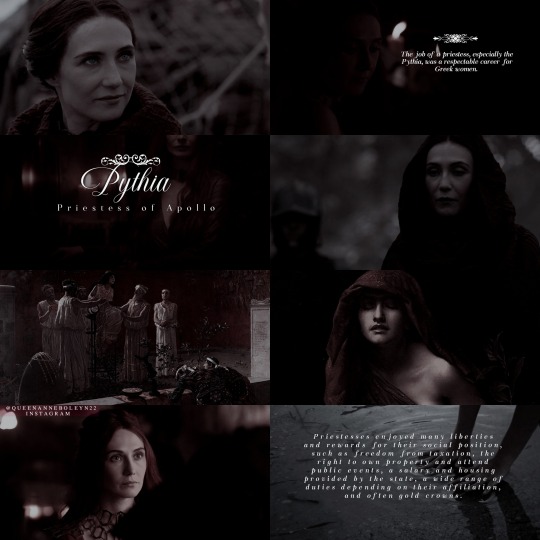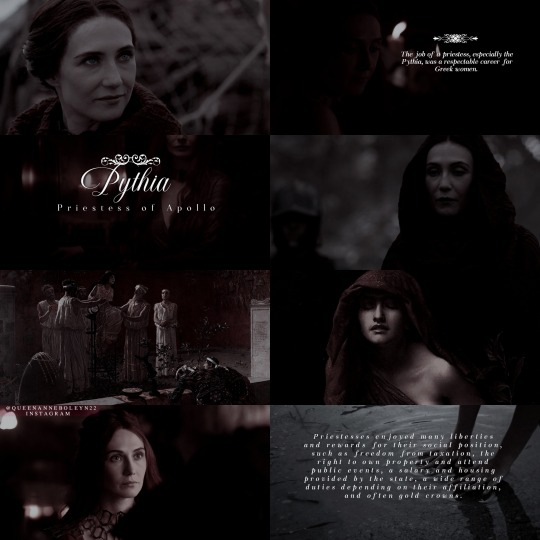#E. M. Berens myths
Text
"Unveiling the Mystique of Antiquity: A Journey Through 'The Myths and Legends of Ancient Greece and Rome' by E. M. Berens"

In the realm of classical mythology, E. M. Berens' "The Myths and Legends of Ancient Greece and Rome" stands as a venerable guide, beckoning readers into the enchanting tapestry of gods, heroes, and timeless tales. As I embarked on this literary odyssey, I found myself captivated by the author's adept storytelling and his ability to breathe life into the ancient narratives, making them accessible and engaging for a contemporary audience.
Berens' comprehensive exploration begins with the origins of the Greek and Roman pantheons, tracing the lineage of deities and the epic events that shaped their divine realms. The book then unfurls a rich tableau of myths, ranging from the birth of the cosmos to the heroic exploits of figures like Hercules, Perseus, and Odysseus. Each narrative is meticulously crafted, with Berens providing insightful commentary that delves into the symbolic and cultural significance of these tales.
What sets Berens' work apart is his knack for blending academic rigor with a storyteller's flair. He navigates the intricate genealogies and complex relationships of the gods with clarity, ensuring that readers, whether well-versed in classical mythology or newcomers to the subject, can easily follow the intricate narratives. The prose is eloquent, evoking the grandeur of ancient civilizations while maintaining a modern accessibility that makes the myths feel vibrant and relevant.
One of the standout features of the book is Berens' meticulous attention to detail. He not only recounts the well-known myths but also unearths lesser-known stories, providing a holistic view of the ancient mythological landscape. The inclusion of lesser-known tales adds depth to the reader's understanding, creating a nuanced portrayal of the diverse characters and themes that populate the classical mythos.
"The Myths and Legends of Ancient Greece and Rome" also serves as a valuable cultural resource, shedding light on the moral and philosophical underpinnings of these ancient societies. Berens explores how these myths were interwoven into the fabric of daily life, shaping religious practices, artistic expressions, and even political ideologies. This contextualization enriches the reader's appreciation for the enduring impact of classical mythology on Western culture.
While Berens' work is undoubtedly a comprehensive and illuminating resource, it is not without its limitations. The book, originally published in the late 19th century, reflects the perspectives and biases of its time. Some readers may find aspects of the text to be outdated or culturally insensitive. Additionally, the absence of in-depth analysis or critical engagement with the source material may leave scholars wanting more scholarly depth.
In conclusion, "The Myths and Legends of Ancient Greece and Rome" by E. M. Berens is a captivating journey through the timeless narratives of classical mythology. Berens' storytelling prowess, coupled with his dedication to presenting a comprehensive overview, makes this book a valuable companion for anyone seeking to explore the rich tapestry of ancient Greek and Roman myths. The author's ability to strike a balance between academic rigor and engaging storytelling ensures that this work remains an enduring classic in the realm of mythological literature.
E. M. Berens' "The Myths and Legends of Ancient Greece and Rome is available in Amazon in paperback 16.99$ and hardcover 23.99$ editions.
Number of pages: 422
Language: English
Rating: 9/10
Link of the book!
Review By: King's Cat
#Ancient Greek mythology#Roman mythology#Classical legends#Mythological pantheon#Gods and goddesses#Heroes and heroines#Mythical narratives#Epic tales#Greek and Roman deities#Mythological stories#Berens' mythology#Ancient epics#Mythical characters#Classical literature#E. M. Berens myths#Mythological retellings#Legendary adventures#Divine genealogies#Classical civilization#Mythological symbolism#Cultural significance#Moral themes#Philosophical concepts#Mythological interpretations#19th-century literature#Ancient cosmogony#Mythical creatures#Heroic exploits#Classical deities#Greek and Roman folklore
6 notes
·
View notes
Text
"Unveiling the Mystique of Antiquity: A Journey Through 'The Myths and Legends of Ancient Greece and Rome' by E. M. Berens"

In the realm of classical mythology, E. M. Berens' "The Myths and Legends of Ancient Greece and Rome" stands as a venerable guide, beckoning readers into the enchanting tapestry of gods, heroes, and timeless tales. As I embarked on this literary odyssey, I found myself captivated by the author's adept storytelling and his ability to breathe life into the ancient narratives, making them accessible and engaging for a contemporary audience.
Berens' comprehensive exploration begins with the origins of the Greek and Roman pantheons, tracing the lineage of deities and the epic events that shaped their divine realms. The book then unfurls a rich tableau of myths, ranging from the birth of the cosmos to the heroic exploits of figures like Hercules, Perseus, and Odysseus. Each narrative is meticulously crafted, with Berens providing insightful commentary that delves into the symbolic and cultural significance of these tales.
What sets Berens' work apart is his knack for blending academic rigor with a storyteller's flair. He navigates the intricate genealogies and complex relationships of the gods with clarity, ensuring that readers, whether well-versed in classical mythology or newcomers to the subject, can easily follow the intricate narratives. The prose is eloquent, evoking the grandeur of ancient civilizations while maintaining a modern accessibility that makes the myths feel vibrant and relevant.
One of the standout features of the book is Berens' meticulous attention to detail. He not only recounts the well-known myths but also unearths lesser-known stories, providing a holistic view of the ancient mythological landscape. The inclusion of lesser-known tales adds depth to the reader's understanding, creating a nuanced portrayal of the diverse characters and themes that populate the classical mythos.
"The Myths and Legends of Ancient Greece and Rome" also serves as a valuable cultural resource, shedding light on the moral and philosophical underpinnings of these ancient societies. Berens explores how these myths were interwoven into the fabric of daily life, shaping religious practices, artistic expressions, and even political ideologies. This contextualization enriches the reader's appreciation for the enduring impact of classical mythology on Western culture.
While Berens' work is undoubtedly a comprehensive and illuminating resource, it is not without its limitations. The book, originally published in the late 19th century, reflects the perspectives and biases of its time. Some readers may find aspects of the text to be outdated or culturally insensitive. Additionally, the absence of in-depth analysis or critical engagement with the source material may leave scholars wanting more scholarly depth.
In conclusion, "The Myths and Legends of Ancient Greece and Rome" by E. M. Berens is a captivating journey through the timeless narratives of classical mythology. Berens' storytelling prowess, coupled with his dedication to presenting a comprehensive overview, makes this book a valuable companion for anyone seeking to explore the rich tapestry of ancient Greek and Roman myths. The author's ability to strike a balance between academic rigor and engaging storytelling ensures that this work remains an enduring classic in the realm of mythological literature.
E. M. Berens' "The Myths and Legends of Ancient Greece and Rome is available in Amazon in paperback 16.99$ and hardcover 23.99$ editions.
Number of pages: 422
Language: English
Rating: 9/10
Link of the book!
Review By: King's Cat
#Ancient Greek mythology#Roman mythology#Classical legends#Mythological pantheon#Gods and goddesses#Heroes and heroines#Mythical narratives#Epic tales#Greek and Roman deities#Mythological stories#Berens' mythology#Ancient epics#Mythical characters#Classical literature#E. M. Berens myths#Mythological retellings#Legendary adventures#Divine genealogies#Classical civilization#Mythological symbolism#Cultural significance#Moral themes#Philosophical concepts#Mythological interpretations#19th-century literature#Ancient cosmogony#Mythical creatures#Heroic exploits#Classical deities#Greek and Roman folklore
0 notes
Text


Oracles
The desire to penetrate the dark veil of futurity, and thereby to avert, if possible, threatened danger, has animated mankind in all ages of the world. Prophetic knowledge was sought by the Greeks at the mouth of oracles, whose predictions were interpreted to the people by priests, specially appointed for the purpose.
The most famous of these institutions was the oracle of Apollo at Delphi, which was held in general repute all over the world. People flocked from far and near to consult this wonderful mouth-piece of the gods, one month in the year being specially set apart for the purpose.
The priestess who delivered the oracles was called the Pythia, after the serpent Python, which was killed by Apollo. Having first bathed in the waters of the Castalian spring, she was conducted into the temple by the priests, and was seated on a sort of three-legged stool or table, called a tripod, which was placed over the mouth of a cave whence issued sulphurous vapours. Here she gradually became affected in a remarkable manner, and fell into an ecstatic condition, in which she uttered wild and extraordinary phrases, which were held to be the utterance of Apollo himself; these the priests interpreted to the people, but in most cases in so ambiguous a manner that the fulfilment of the prediction could not easily be disputed. During the ceremony, clouds of incense filled the temple, and hid the priestess from the view of the uninitiated, and at its conclusion she was reconducted, in a fainting condition, to her cell. The following is a striking instance of the ambiguity of oracular predictions:—Crœsus, the rich king of Lydia, before going to war with Cyrus, king of Persia, consulted an oracle as to the probable success of the expedition. The reply he received was, that if he crossed a certain river he would destroy a great empire. Interpreting the response as being favourable to his design, Crœsus crossed the river, and encountered the Persian king, by whom he was entirely defeated; and his own empire being destroyed, the prediction of the oracle was said to have been fulfilled.
Source: Myths and Legends of Ancient Greece - A Handbook of Mythology, E. M. Berens
#greekmythedit#greek mythology#greek history#pythia#oracle of delphi#delphi#oracle#delphi temple#carice van houten#apollo#god apollo#apollon#priestess#mythology edit#mythologyedit#mythology#greekmythologyedit#greek myth aesthetic#greek myth edit#priestess of apollo#cyrus of persia#croesus#myths#oracle of apollo#python#mythology dreamcast#aesthetic#myth#apolloedit
41 notes
·
View notes
Text

The Myths & Legends of Ancient Greece and Rome, E. M. Berens
71 notes
·
View notes
Text
Look at this absolute banger I found in Myths and Legends of Ancient Greece and Rome by E. M. Berens

44 notes
·
View notes
Video
youtube
Myths and Legends of Ancient Greece and Rome | E. M. Berens | *Non-fiction, Children's Fiction, Fantastic Fiction, General Fiction, Myths, Legends & Fairy Tales, Self-Help | Audiobook full unabridged | English | 1/7 Content of the video and Sections beginning time (clickable) - Chapters of the audiobook: please see First comments under this video. This is a comprehensive collection of all the major and minor gods of Rome and Greece, with descriptions of festivals and retellings of major mythological stories. (Summary by Sibella) This is a Librivox recording. If you want to volunteer please visit https://librivox.org/ by Priceless Audiobooks
0 notes
Link
history of audiobooks : Myths and Legends of Ancient Greece and Rome by E. M. Berens | History
Listen to Myths and Legends of Ancient Greece and Rome new releases history of audiobooks on your iPhone, iPad, or Android. Get any AUDIOBOOK by E. M. Berens History FREE during your Free Trial
Written By: E. M. Berens
Narrated By: Group
Publisher: Authors Republic
Date: May 2017
Duration: 11 hours 15 minutes
#Myths and Legends of Ancient Greece and Rome#Myths and Legends of Ancient Greece and Rome Audiobook#Audiobook#History#E. M. Berens#Group
0 notes
Video
Myths And Legends Of Ancient Greece And Rome By E M Berens Part 2
0 notes
Note
1. How does your beauty still leave me speechless every week? A minha crush cresce tipo exponencialmente quando te vê, why do u do this to me? 2. Vi mitologia e livro no teu post e fiquei !!! podes partilhar o nome?? 3. Apostei dinheiro no benfica amanhã, porque é que faço isto a mim próprio?
aiiiiii obrigada ❤️❤️ sobre o livro well im poor sooo fiz o download dum que tinha a história de bué figuras mitológicas, mas ainda não li /bem/ tava só a ler de algumas que me interessavam pelo indice lmao por isso idk se é muito bom?? mas o nome é myths and legends of acient greece and rome de E. M. Berens!! e ya tás fodido we’re gonna die
0 notes
Text


Oracles
The desire to penetrate the dark veil of futurity, and thereby to avert, if possible, threatened danger, has animated mankind in all ages of the world. Prophetic knowledge was sought by the Greeks at the mouth of oracles, whose predictions were interpreted to the people by priests, specially appointed for the purpose.
The most famous of these institutions was the oracle of Apollo at Delphi, which was held in general repute all over the world. People flocked from far and near to consult this wonderful mouth-piece of the gods, one month in the year being specially set apart for the purpose.
The priestess who delivered the oracles was called the Pythia, after the serpent Python, which was killed by Apollo. Having first bathed in the waters of the Castalian spring, she was conducted into the temple by the priests, and was seated on a sort of three-legged stool or table, called a tripod, which was placed over the mouth of a cave whence issued sulphurous vapours. Here she gradually became affected in a remarkable manner, and fell into an ecstatic condition, in which she uttered wild and extraordinary phrases, which were held to be the utterance of Apollo himself; these the priests interpreted to the people, but in most cases in so ambiguous a manner that the fulfilment of the prediction could not easily be disputed. During the ceremony, clouds of incense filled the temple, and hid the priestess from the view of the uninitiated, and at its conclusion she was reconducted, in a fainting condition, to her cell. The following is a striking instance of the ambiguity of oracular predictions:—Crœsus, the rich king of Lydia, before going to war with Cyrus, king of Persia, consulted an oracle as to the probable success of the expedition. The reply he received was, that if he crossed a certain river he would destroy a great empire. Interpreting the response as being favourable to his design, Crœsus crossed the river, and encountered the Persian king, by whom he was entirely defeated; and his own empire being destroyed, the prediction of the oracle was said to have been fulfilled.
Source: Myths and Legends of Ancient Greece - A Handbook of Mythology, E. M. Berens
#greekmythedit#greek mythology#greek history#pythia#oracle of delphi#delphi#oracle#delphi temple#carice van houten#apollo#god apollo#apollon#priestess#mythology edit#mythologyedit#mythology#greekmythologyedit#greek myth aesthetic#greek myth edit#priestess of apollo#cyrus of persia#croesus#myths#oracle of apollo#python#mythology dreamcast#aesthetic#myth#apolloedit
24 notes
·
View notes
Text

"But Apollo, the eternally beautiful youth, the perfection of all that is graceful and refined, rarely seems to have been happy in his love; either his advances met with a repulse, or his union with the object of his affection was attended with fatal consequences. His first love was Daphne (daughter of Peneus, the river-god), who was so averse to marriage that she entreated her father to allow her to lead a life of celibacy, and devote herself to the chase, which she loved to the exclusion of all other pursuits. But one day, soon after his victory over the Python, Apollo happened to see Eros bending his bow, and proud of his own superior strength and skill, he laughed at the efforts of the little archer, saying that such a weapon was more suited to the one who had just killed the terrible serpent. Eros angrily replied that his arrow should pierce the heart of the mocker himself, and flying off to the summit of Mount Parnassus, he drew from his quiver two darts of different workmanship - one of gold, which had the effect of inspiring love; the other of lead, which created aversion. Taking aim at Apollo, he pierced his breast with the golden shaft, whilst the leaden one he discharged into the bosom of the beautiful Daphne. The son of Leto instantly felt the most ardent affection for the nymph, who, on her part, evinced the greatest dislike towards her divine lover, and, at his approach, fled from him like a hunted deer. He called upon her in the most endearing accents to stay, but she still sped on, until at length, becoming faint with fatigue, and fearing that she was about to succumb, she called upon the gods to come to her aid. Hardly had she uttered her prayer before a heavy torpor seized her limbs, and just as Apollo threw out his arms to embrace her, she became transformed into a laurel-bush. He sorrowfully crowned his head with its leaves, and declared, that in memory of his love, it should henceforth remain evergreen, and be held sacred to him.-"THE MYTHS AND LEGENDS OF ANCIENT GREECE AND ROME" by E. M. Berens,2010
#perioddramaedit#edit#history edit#history#greek myth aesthetic#greek myth#mythology#mythological#apollo#apollo and daphne#nymph daphne#daphne#peneus#laureal tree#mythology edit#greek mythology#greek gods#ancient greek#apolloedit#brad pitt#mine#daphne and apollo#legend#ancient greece
31 notes
·
View notes
Text

"And now came the mournful task of informing Achilles of the fate of his friend. He wept bitterly over the dead body of his comrade, and solemnly vowed that the funereal rites should not be solemnized in his honour until he had slain Hector with his own hands, and captured twelve Trojans to be immolated on his funeral pyre. All other considerations vanished before the burning desire to avenge the death of his friend; and Achilles, now thoroughly aroused from his apathy, became reconciled to Agamemnon, and rejoined the Greek army. At the request of the goddess Thetis, Hephaestus forged for him a new suit of armour, which far surpassed in magnificence that of all the other heroes.Thus arrayed he was soon seen striding along, calling the Greeks to arms. He now led the troops against the enemy, who were defeated and put to flight until, near the gates of the city, Achilles and Hector encountered each other. But here, for the first time throughout his whole career, the courage of the Trojan hero deserted him. At the near approach of his redoubtable antagonist he turned and fled for his life. Achilles pursued him; and thrice round the walls of the city was the terrible race run, in sight of the old king and queen, who had mounted the walls to watch the battle. Hector endeavoured, during each course, to reach the city gates, so that his comrades might open them to admit him or cover him with their missiles; but his adversary, seeing his design, forced him into the open plain, at the same time calling to his friends to hurl no spear upon his foe, but to leave to him the vengeance he had so long panted for. At length, wearied with the hot pursuit, Hector made a stand and challenged his foe to single combat. A desperate encounter took place, in which Hector succumbed to his powerful adversary at the Scaean gate; and with his last dying breath the Trojan hero foretold to his conqueror that he himself would soon perish on the same spot." -THE MYTHS AND LEGENDS OF ANCIENT GREECE AND ROME" by E. M. Berens,2010
#mythological#hector#hector of troy#mythology edit#troy#city of troy#trojan war#archaic period#greece#ancient greek#modern#aestethic#edit#history edit#perioddramaedit#eric bana#modern aesthetic#greek mythology#greek history#ancient history#qab22
26 notes
·
View notes
Text

"In one of the engagements which took place soon afterwards, the Trojans, under the command of Hector, penetrated into the heart of the Greek camp, and had already commenced to burn their ships, when Patroclus, seeing the distress of his countrymen, earnestly besought Achilles to send him to the rescue at the head of the Myrmidons. The better nature of the hero prevailed, and he not only intrusted to his friend the command of his brave band of warriors, but lent him also his own suit of armour. Patroclus having mounted the war-chariot of the hero, Achilles lifted on high a golden goblet and poured out a libation of wine to the gods, accompanied by an earnest petition for victory, and the safe return of his beloved comrade. As a parting injunction he warned Patroclus against advancing too far into the territory of the enemy, and entreated him to be content with rescuing the galleys. At the head of the Myrmidons Patroclus now made a desperate attack upon the enemy, who, thinking that the invincible Achilles was himself in command of his battalions, became disheartened, and were put to flight.
Patroclus followed up his victory and pursued the Trojans as far as the walls of their city, altogether forgetting in the excitement of battle the injunction of his friend Achilles. But his temerity cost the young hero his life, for he now encountered the mighty Hector himself, and fell by his hands. Hector stripped the armour from his dead foe, and would have dragged the body into the city had not Menelaus and Ajax the Greater rushed forward, and after a long and fierce struggle succeeded in rescuing it from desecration."-"THE MYTHS AND LEGENDS OF ANCIENT GREECE AND ROME" by E. M. Berens,2010
#hector#hector of troy#eric bana#troy#troy 2008#edit#greek myth#greek mythology#ancient greece#ancient history
23 notes
·
View notes
Text

"Zeus had seven immortal wives, whose names were Metis, Themis, Eurynome, Demeter, Mnemosyne, Leto, and Hera. Metis , his first wife, was one of the Oceanides or sea-nymphs. She was the personification of prudence and wisdom, a convincing proof of which she displayed in her successful administration of the potion which caused Cronus to yield up his children. She was endowed with the gift of prophecy, and foretold to Zeus that one of their children would gain ascendency over him. In order, therefore, to avert the possibility of the prediction being fulfilled he swallowed her before any children were born to them. Feeling afterwards violent pains in his head, he sent for Hephaestus, and ordered him to open it with an axe. His command was obeyed, and out sprang, with a loud and martial shout, a beautiful being, clad in armour from head to foot. This was Athene (Minerva), goddess of Armed Resistance and Wisdom." -"THE MYTHS AND LEGENDS OF ANCIENT GREECE AND ROME" by E. M. Berens,2010
#greek myth#greek goddess#greek mythology#greek gods#mythology edit#mythologyedit#mythology dreamcast#mythological#mythology#zeus#metis#zeus and metis#mount olympus#ancient greek#ancient greece#ancient rome#e.m berens#athena#pallas athena#laura haddock#jonathan rhys meyers
50 notes
·
View notes
Video
youtube
Myths and Legends of Ancient Greece and Rome | E. M. Berens | *Non-fiction, Children's Fiction, Fantastic Fiction, General Fiction, Myths, Legends & Fairy Tales, Self-Help | Audiobook full unabridged | English | 2/7 Content of the video and Sections beginning time (clickable) - Chapters of the audiobook: please see First comments under this video. This is a comprehensive collection of all the major and minor gods of Rome and Greece, with descriptions of festivals and retellings of major mythological stories. (Summary by Sibella) This is a Librivox recording. If you want to volunteer please visit https://librivox.org/ by Priceless Audiobooks
0 notes
